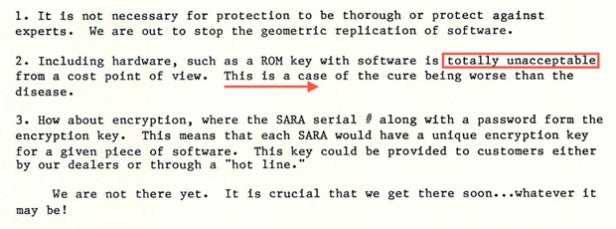If Apple listened to its own advice from 1979, we’d need fewer dongles

In terms of connectivity options, Apple devices are shedding like an Alsatian in a sauna and, for most users, it means buying new accessories or carting around an array of dongles.
Whether it’s the loss of the headphone jack on the iPhone 7 or the dismissal of practically all of the ports from the new MacBook Pro, it can be an expensive or cumbersome business for adopters.
Related: MacBook Pro review
However, if Apple had taken heed of some of its earliest convictions the whole kerfuffle could have been avoided.
An array of company memos have come to light revealing one Apple staffer rejected out of hand a suggestion that a hardware key could be used to protect against piracy through a Software Security from Apple’s Friends and Enemies (SSAFE) initiative.
The memo from Apple employee Barry Yakoni called the prospect “totally unacceptable.”
Echoing the sentiments of many Apple users since the advent of the dongle-verse Yakoni wrote: “This is a case of the cure being worse than the disease.”

(Image credit 9to5Mac)
Amazingly, the memos were found in a book bin at a Good Will store, in Seattle, and contain a treasure trove of progess reports, notes and discussions between some of Apple’s earliest employees, including co-founder Steve Wozniak.
They’re believed to belong to Jack MacDonald who was the systems software manager for the Apple II and Apple III computers. How they ended up at Good Will no-one knows.
Gizmodo, who picked up the documents via a Redditor, has some good stuff from elsewhere in the documents.
Have Apple done customers a disservice by removing so many connectivity options? Or is it all in the name of progress?


